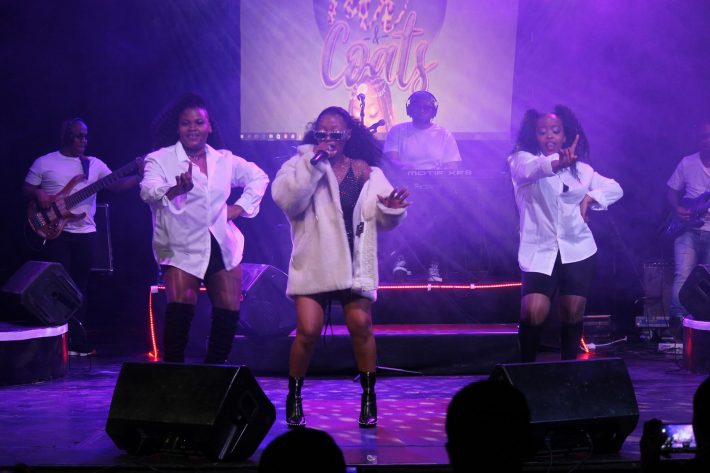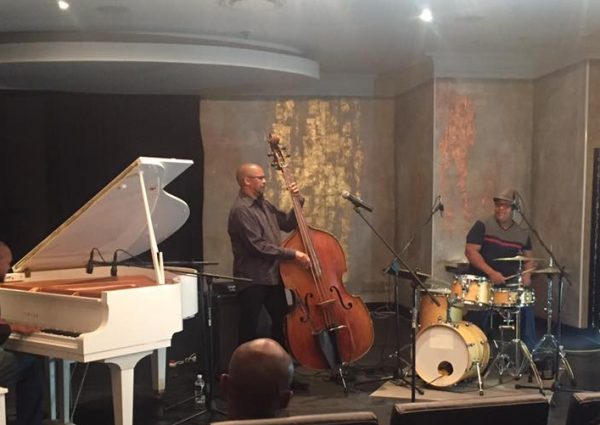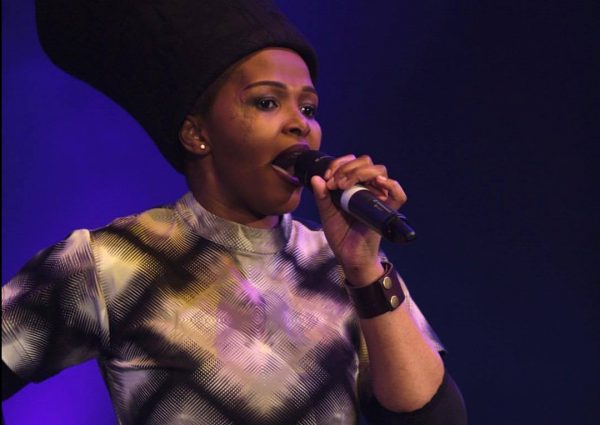Even as she suffered an asthma attack just moments before her time on stage, Noxy still lived up to her vows of loving and respecting the arts—in sickness and in health, reports Ace Moloi
In sickness and in health
“The aim of art,” Aristotle has written, “is to represent not the outward appearance of things, but their inward significance.” To write about art, therefore, is to first and foremost fall in love with the artist’s soul even in its innermost ugliness.
What I love about my arts journalism career is the ambiguity of the meanings I process; in theatre for a play or striding along art gallery corridors staring at artworks on exhibition, wondering like Peter Gabriel in the Blood of Eden: “Is that a dagger or a crucifix I see?” Art is truly an outward expression of the ‘dagger or crucifix’ crisis of identity. You won’t know what’s in an artist’s clenched fist until they cut or heal you with it.
On 26 August 2021, Nonkosi “Noxy” Sokoyi presented the second instalment of her flagship production, Fur & Coats, at the Mangaung Civic Theatre. The show offered artists some salvation from the condemnation of COVID-19, which has taken the form of ridiculously culled numbers at shows, funding greed and the slow payment process of relief funds by the (ir)relevant department of arts and culture. This is the frustration similar to what Presss felt when he penned Chasing the Rainbow: because to expect government to care about the creative industry is wasteful optimism. Like chasing a rainbow.
Presss, the night’s surprise act, was like a parent walking their daughter, Noxy, to the altar to marry the arts she has chosen to be her husband. So enduring a covenant that even as she suffered a life-threatening asthma attack moments before her time on stage, Noxy didn’t break her vows to love and respect the arts. In sickness and in health.
Dumelang, ke nna Bondo
In the whole line-up, nobody could narrate the beauty of this love story like OnPoint keyboardist Dumelang, going as Bondo when performing. Bondo’s lyrical storytelling rides on the wavelength of his limitless voice and his musical presentation makes you question the practicality of intercultural love. I mean, is there anyone among you, basadi ba Basotho, who wouldn’t drip Danone (and some other juicy liquids) at the thought of Bondo singing, “Ke a o tshepisa . . . ke tla o rata hofihlela”?
The path Bondo has taken, of writing music in Sesotho, is artistically and commercially defiant. And one can only hope he doesn’t falter along the way, because those who took it before him seem to now have more isiZulu songs than Sesotho ones. Tipsy in my admiration of his narrative prowess, I whispered to a friend that history will judge us for not playlisting such music on radio. That’s if the songs have been released, of course. Artists in this city hoard music like Zakes Bantwini is keeping Osama from Shazaam.
Always the diva, the ever stylish Noxy. Credit: Mzwandile Sokoyi
Artists, not cover stars
In my books (excuse the pun), Itu Marema was the ultimate best act for the night. The Theunissen-born muso stood out for me not only because I stood up throughout his set, but also owing to his power-packed voice that boasts an inimitable authenticity. With a stage persona of a megastar in the making and a solid spiritual base, he’s a ticking bomb destined to blow the SA music scene into beautiful pieces.
Itu kicked his set off with S’java’s Impilo, a song that reminded all of us that though we may find ourselves in the unprecedented age of the Coronavirus, kodwa impilo k’mele iqhubeke. Before calling S’nazo, the Ntliziyo Yam sensation, to join him in the rendition of Nathi’s Impilo, he revisited a classic Umanji song I’m conflicted to write about, hobane e bua ka Moloi and I’m terrified of suffering the fate of one self-loving Narcissus, the legendary ancestor of Narcissists.
As Itu and S’nazo belted “angeke ndikwazi ukuphila ngaphandle kwakho”, I flashed back to their chilling Sixoleleni collabo at the recently held Night with the Stars and wondered why they don’t do more original songs together—and, yes, release the damn beauties. This city must export more original music to the world instead of celebrating cover stars.
In the beginning was Khuthala Mxhamli
A show this explosive had to have a cooling period. Something Kaydo Matthews donated to us when he substituted the OnPoint gang of Dumelang, Platjie, Tebogo and the show’s top-tier drummer Bafana with his own squad—Thoriso, Sihle, Hloni and Shane.
Unfazed by the time wasted plugging his band in, and poised in his posture as the night’s baddest boy, Kaydo introduced himself with a slow jam version of Gnarls Barkley’s otherwise groovy Crazy. It was followed by his songbook originals such as Nkamohele and Nguwe. But if it was his phone call stunt of a mad girlfriend protesting for her artist boyfriend to give her attention Kaydo thought would immortalize his performance, it was in fact his choice to wrap things up with R. Kelly’s Happy People that was even more newsworthy. O, how it really made people happy! The paradox of cancel culture.
Of course, in the beginning was Khuthala, who lit the match that set the stage before us on fire. Before trampling it barefoot like a proud village girl. She announced herself with Burundian singer Khadja Nin’s Wale Watu, a song so sorrowful and warm, so timely and timeless. I understood her to be bandaging the wounded souls in bodies covered in furs and coats, singing in French: They neither cry nor demand charity; the people sing; even when they sleep with empty stomachs.
The opening act is to a show what an author’s first line is to a book, and through Khuthala’s time on stage was about creating expectations of more from the night. More from the zealous crawling photographer. More from the non-binary selection of enthusiastic BVs, Ishmael Mohlabi, Pule Mokone and Lucky Malaza, who turned that stage into their oyster.
Itu Marema and S'nazo share the stage. Credit: Mzwandile Sokoyi
The carefree and the curfewed
This is the kind of electromagnetic atmosphere Noxy strutted into as she made her majestic entrance, sandwiched by her two dancer angels, Moutee and Karabo, to seal what was a truly refreshing night in this city that once had a football team in the PSL.
If apparel and song selection maketh an artist, Noxy has mastered the laws of captivating crowds. Bursting onto the stage in a suit the texture of glimmering royalty – and later a good-girl-gone-bad black jumpsuit – it was clear that her only business for the night was to give the people what they want, a show.
Noxy’s first track was Stand Up by English singer and actress, Cynthia Erivo. The song was recorded for Harriet, a biographical film about the underground railroad slave liberator, Harriet Tubman, portrayed by Cynthia herself. Even as we were racing against the claws of curfew, the people’s willingness to feast from her menu – and even stay a bit longer for Brenda’s dessert performance – proved just how loved the Fur & Coats brand is becoming.
Screw the curfew, I thought of screaming as my gin and tonic started undressing my shyness, making me carefree. Black lives have always been ruled by curfew. Interstate bus times impose it on us. Retail security evokes it when we take suspiciously longer in the shop. What’s new?
FEATURED IMAGE: Miss Noxy blazing up the stage. Credit: Mzwandile Sokoyi
Ace Moloi is a writer and author.






